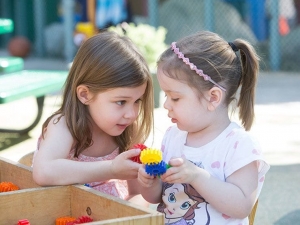Preschools Vs Pre-Kindergartens-Compare and contrast sample essay

ECE (Early Childhood Education) is a branch of education that deals with the formal and informal teaching of children up to eight years of age (Veisson Hujala Smith & Waniganayake 2012). Pre-kindergarten and preschool are two examples of educational institutions that provide early childhood education. This paper will examine the similarities and differences between pre-kindergarten and preschool.
Similarities Of Preschools Vs Pre-Kindergartens.
Both pre-kindergarten and preschool offer meaningful learning opportunities for their students. Playful learning is used to focus on the interests of learners. The play technique is used in children’s learning so that they can develop and grow in many areas (Veisson Hujala Smith & Waniganayake 2012). Through activities that are appropriate for their age, the learning activities should be meaningful. These activities can include art, music, science, math, reading, and other arts. These activities encourage creativity, leadership, problem-solving skills, and teamwork among other things.
Second, both schools encourage social and emotional growth. Research has shown that children’s emotional and social growth should begin in their early years. (Koshal 2019, 2019). Teachers must create safe environments for learners. These environments enable children to form relationships and connections with their environment, peers, as well as those around them. Koshal states that children should be taught social skills by mentorship, direct teaching and interaction.
Differences between Preschools Vs Pre-Kindergartens.
There are some differences between pre-kindergarten and preschool. They differ in terms both of the ages and developmental stages of learners. Preschool classes have children aged between 2 and 4 years. Pre-kindergarten classes have children aged 4-5 years. Pre-kindergarten students engage in structured skill-building and intense learning activities. These activities prepare children for kindergarten (Koshal 2019, 2019). Preschool learning activities are more playful than those in pre-kindergarten. Preschools employ group instruction and play to learn in their day-to-day learning.
The activities in pre-kindergarten schools are structured more than those in preschool (Koshal 2019, p. 2). Preschools can be compared to baby daycares in that they are more or less structured. Pre-kindergarten lessons are structured well, while the curriculum focuses on a specific area. Pre-kindergarten teaches skills such as critical thinking, mathematics, and sciences. Preschools, on the other hand equip learners with self-help skills and problem-solving skills. Pre-kindergartens offer activities such as structured problem-solving and writing. Preschools focus on colors, shapes and alphabets as well as sounds, sounds, and numbers (Veisson Hujala Smith & Waniganayake 2012).
Pre-kindergarten activities are meant to prepare learners for intensive and advanced learning, while preschool activities allow them to be independent and have positive interactions with their environment and people (Koshal 2019, 2019). Preschool learners need to learn how to interact and cooperate with their peers and teachers.
Pre-kindergarten classes are often connected to the rest school environment, while preschools are typically isolated. The preschools are usually not connected to the larger school environment because the children are too young or sensitive. They need extra care and caution (Koshal 2019, 2019).
Conclusion
Pre-kindergarten and preschool education are crucial for children’s growth and development. Children learn valuable skills by playing, teamwork, and collaboration with people as well as the environment. These skills will be a major part of the children’s future endeavors and aspirations.
REFERENCES
Koshal, B. (2019). Difference Between Preschool and Kindergarten | Compare the Difference Between Similar Terms. Retrieved 14 November 2019, from https://www.differencebetween.com/difference-between-preschool-and-vs-kindergarten/
Veisson, M., Hujala, E., Smith, P., & Waniganayake, M. (2012). Global Perspectives in Early Childhood Education. Frankfurt: Lang, Peter, GmbH, Internationaler Verlag der Wissenschaften.
